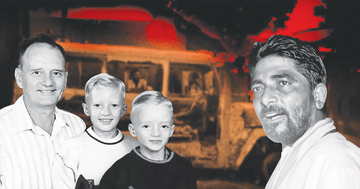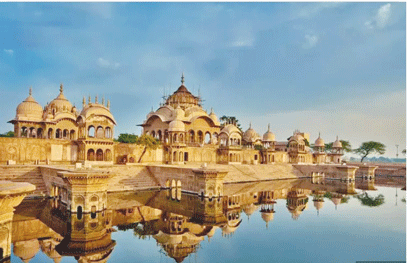ACTION REPLAY: There have been demands for extension of the Mathura Krishna Temple by demolishing the adjoining mosque
By Ismat Ara
The National Commission for Minorities which is packed with Modi bhakt refuse to acknowledge that the attacks on minorities have risen sharply since the BJP came to power in 2014. After the demolition of the Babri Masjid there are now demands for demolishing the masjid adjoining the Krishna Temple in Mathura…
ON Minorities Rights Day representatives of various minority religions presented a distinctly different picture than what the National Commission for Minorities portrays. On the morning of December 18, National Minorities’ Rights Day was celebrated by the National Commission for Minorities.
The National Commission for Minorities (NCM) comes under the jurisdiction of the Ministry of Minority Affairs and is not only tasked with the evaluation of development of minorities under the Union government and states, but also to look into specific complaints regarding deprivation of minority rights.
The NCM is also responsible for taking up relevant issues with the appropriate authorities as well as investigating matters of communal conflict and riots.
However, from June 2020 to September 2021 until the appointment of former IPS officer Iqbal Singh Lalpura, the commission was functioning without a head.
Chairperson of the Commission Iqbal Singh in his address on Saturday, said that there are no religion-based atrocities against minorities in India. The celebration event to mark the day was held at Ambedkar International Centre and attended by several members of the commission including Atif Rasheed, Vice-Chairperson of the Commission, Mukhtar Abbas Naqvi, Union Minister of Minority Affairs, and John Barla, MoS, Ministry of Minority Affairs.
Lalpura further said, “Jis desh mein hum rehte hain diversity me unity hai. Jahan diversity hai…thoda bahut chalta rehta hai.” (‘In India, there is unity in diversity. Some things are bound to happen when there is diversity.’)
Union minister Mukhtar Abbas Naqvi at the same event said that any kind of “Talibani mentality” will not work in India, while hitting out at the opposition of criminalisation of triple talaq, women travelling alone for Haj and increase in legal age of women for marriage.
Laws
The Karnataka assembly is likely to soon table a controversial ‘anti-conversion bill’ even as opposition parties as well as minority communities, especially Christians, continue to oppose it.
The bill is ‘anti-minority’ and will be used to harass them, some say. Others ask about the need for new legislation when a law to prevent unlawful conversions through force, allurement or inducement is already in place.
Since the Bharatiya Janata Party-led Karnataka government first spoke of the anti-conversion law, there has been a spike in the attacks on churches and Christians.
Last week, a video of a man holding a sword entering a church in Belagavi and threatening the pastor went viral on social media.
A.C. Michael, a former member of Delhi Minorities Commission and National Coordinator of United Christian Forum (UCF) said that Christians across India are increasingly feeling ‘threatened,’ especially in light of statements from the Rashtriya Swayamsevak Sangh.
“Just a few days back, Indresh Kumar of the RSS said that Christians are a threat to other religions. We do not force or allure anybody to convert to Christianity, but the RSS imposes its ideology on everybody. It seems Kumar is talking about his own gang,” Michael said.
Christians are among the six notified minorities in India. Others are Muslims, Sikhs, Buddhists, Parsis (Zoroastrians) and Jains.
‘Rice bag’
In 2020, several Christian women on Twitter were attacked by the right wing with the derogatory term ‘rice bag convert’, implying that Christians in India were originally Hindus and they converted merely for a “bag of rice”.
A.C. Michael told The Wire that the roots of this term are very old and were used to refer to the barter system in old times when rice was used in exchange for goods.
“Even now, the church occasionally distributes rice bags. But the term has been appropriated by the right wing and made into a slur,” he said.
Apart from these attacks on social media, there are no coordinated large-scale attacks on Christians or major Christian churches, Michael added. He feels that it is part of the right wing’s strategy to facilitate many small attacks in different regions instead of a few big ones.
“This instills a sense of fear among the community successfully,” he said.
Ashlin Mathew, a reporter with a national daily reiterated that Christians are increasingly worried about their children being bullied in school on the basis of prejudice.
“Move out of the country if you have the means,” has been her advice to friends and family.
For the first time, she says, several Indian Christians are leaving the country not for economic reasons, but because they worry about their kids’ safety in the growing polarised environment.
“How did a few Jews survive the holocaust? They saw it coming and they escaped. People who can should leave,” she said.
Mathew says that in the recent years as cases against minorities are on a rise, she has been constantly reminded of being Christian, and in effect, a minority.
She says that not enough conversations are happening, even among the Christian community, to address these issues.

‘Living together’
A.C. Michael, on the other hand, says that there is an increased sense of responsibility among Christians since the BJP came to power in 2014 to speak up.
He himself launched the United Christian Forum (UCF) in 2015 after multiple instances of violence against Christians in 2014. He has been running this organisation alongside his full time managerial job at a manufacturing factory.
In 2021 alone, more than 400 incidents of violence against Christians across the country were reported on the UCF helpline.
Michael says that most victims are Protestants, who are in the minority among Christians in India.
Among the Christian population – about 2.3% of the entire Indian population – more than 70% are Catholics.
The smaller churches which are the main targets of attacks accommodate Christians of diverse ideologies, unlike the Catholic churches. Despite the difference in beliefs, he said, Christians support each other.
He is hopeful that soon, the members of the majority community will ‘wake up’ and start speaking up for Christians.
“People of India will wake up. They will have to see that they are wrong and acknowledge the crimes done against us. We Indians have always lived together,” he said.
But not all minority groups share this hope.
No level playing field
Bilal Zaidi, a former journalist who has covered several elections as well as the Indian parliament closely for over a decade, recently left the country because he believes that marginalised communities are not given a level playing field.
He had started a campaign platform for young and emerging leaders in India known as Our Democracy which did crowdfunding for leaders such as Atishi and Kanhaiya Kumar, now with Aam Aadmi Party and Congress respectively.
As an entrepreneur looking to make an impact within the start-up space, he said that only members of the ‘upper’ Hindu caste groups dominate the space currently.
“Where are the Scheduled Castes, tribals and minorities in the Forbes lists?” he asked, while pointing out that the existing system does not give access to the said communities.
“Nobody talks about the fact that people in the top generally belong to privileged castes and communities. Even the media is filled with members of the dominant caste,” he said.
People from the minority groups are much better off working at more global positions, as they offer an equal opportunity for success.
However, some members of the minority groups are determined to not leave the country.
‘Don’t leave’
Abu Sufiyan, founder of cultural organisations such as Purani Dilliwaalon Ki Baatein, Old Delhi Podcast, and We The Change initiative says that while it may be a feasible option for the privileged class to move out of the country for better opportunities and living conditions, majority of Muslims cannot even think about leaving the country ‘no matter how unsafe it becomes for them’.
“Maybe, I can easily move out. But if all of us move out, who will guide the Muslim youth and masses who cannot leave mainly due to financial restraints?” he asked.
Hence, he says, it is really important to motivate the Muslim youth to not only stay in the country but also come forward in the administration – the services, police and army.
His organisation aims at changing dominant narratives and stereotypes about Muslims through cultural activities. But it is not easy. During a Union government project that he was working on, he was called ‘Talibani’.
He recalls, “I responded by telling the person who called me this that his ashes will be thrown in the river and my remains will get mixed with the soil. Both water and soil are important elements of nature. He did not know what to say.”
The latest incident was three days ago.
“I was shooting a kid who was dressed up as Ghalib. A police man asked why I was shooting a Muslim. ‘Couldn’t you find a real Indian?’ he asked me. I told him that the existence of Ghalib is older than the existence of India, after which he made a face and left.”
Sufiyan believes that the only way of ensuring harmony between different communities is to encourage dialogue.
“Whenever we encounter extremist voices, we have to respond smartly and strategically so those voices are not emboldened. Question their prejudicial beliefs perpetuated by television visuals and WhatsApp messages,” he said.
Sufiyan added that elite Muslims who can leave the country should not demoralise others who cannot.
Uprising
Punjab, according to Navkiran Natt, a 29-year-old Sikh woman who participated extensively in the farmers’ protest, is also facing a similar dilemma. The recent withdrawal of the three farm bills by the Modi government was a big achievement for the Sikh community, another minority group in India.
Since the past two decades, she says, there has been a crisis in Punjab as more and more young Sikhs are leaving the country. “They were leaving as they did not see any point in staying here. Because of that, there was a vacuum of young leadership in the state,” she said.
But the farmers’ movement has changed that. “Young people participated in the movement, and spoke against the government. This is how political leadership is born,” she said, adding that there is a sincere need for minorities to take control of their narratives and strengthen their political demands.
Sikhs are in majority in the state of Punjab. She said that there is a need to safeguard the federal system in the country and to that end, not let BJP accumulate too much power.
During the farmer protests, which comprised large numbers of Punjabi Sikh farmers, they were demonised and even referred to as ‘Khalistani’ separatists.
To counter fake news and false narratives against the farmers during the protest, Natt started a newspaper called Trolley Times with her friends.
She said that Sikhs are often not seen as big a “threat” as Muslims by believers of the Hindutva ideology as they appropriate them and want to incorporate them into the Hindutva framework.
But because Sikhs disagree with the Hindutva theory of “one nation, one religion” that has gained momentum since 2014, she says, they are now increasingly seen as a threat.
“Sikhs are assertive about their religious identity and refuse to become part of the Hindutva structure,” she told The Wire.
She added, “Because Sikhism originated from Hinduism, the RSS and BJP want to use us to oppress other minorities. But we are a minority and as Sikhs we understand the difficulties associated with it. They also forget that Sikhism was formed as a rebellion against Hinduism.”
Courtesy: The Wire
